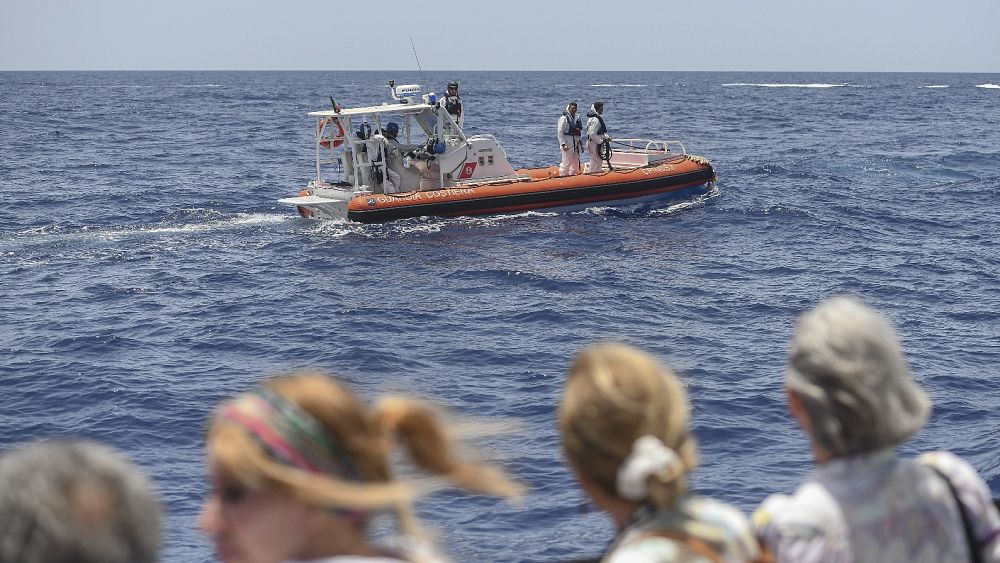World
Search and Rescue: Why shipwrecks keep happening in European waters

There is little cooperation between national coast guard services and NGOs.
The latest tragic shipwreck off the Greek coast, one of the worst in European history, once again reignited the debate as to whether the EU is doing enough to prevent loss of life of migrant people at sea.
Currently, each coastal or island country is responsible for its Search and Rescue zone in the Mediterranean Sea, where it is obliged to initiate operations to rescue boats in distress if needed by involving private ships.
As the EU member state in charge of the rescue is also the one in charge of disembarkment and processing possible asylum requests, national coast guards are often suspected of waiting as much as possible before taking action.
According to media reports, for example, Greek authorities waited for a long time before intervening last week, probably hoping that the boat would continue on its course to Italy, even if it was already in distress.
The European Union has limited competencies in this kind of operation. The bloc’s external border agency, Frontex, provides help through aerial surveillance and could assist in a rescue if ordered by the responsible national authority, but cannot carry out a rescue independently.
Many claim that a European rescue mission in the Mediterranean would help to improve the situation.
But the reform of the EU migration policy does not foresee that kind of thing, as Pietro Bartolo, a member of the S&D group in the European Parliament, deplored.
Bartolo was part of a delegation from the Parliament that this week visited the Italian island of Lampedusa, geographically closer to Africa than to Europe, in order to observe how the activity of Search and Rescue in the sea is carried out.
“At the beginning of the legislature, the first thing I asked for was a resolution providing for a European sea search and rescue service, obviously in coordination with the member states of the first port of call,” Bartolo told Euronews.
“However, after six months of work we took it to the plenary, where, to my great regret, we lost by just two votes. I was very sorry about this, but surely Europe must do something,” he added.
Private entities are also carrying out search and rescue operations in the Mediterranean Sea, even if on a smaller scale compared to national services. According to Bartolo, NGOs carry out about 10% of rescue operations in the Central Mediterranean.
But some governments have been accused of attempting to curtail or even ban their operations. Italy for example, is forcing them to dock after a single rescue and assigns ports of disembarkment very far from the places where rescues happen.
“NGOs are being criminalised so much when instead they could work together to try to save as many people as possible. But there is an incomprehensible hostility towards them. I do not understand, also because, despite all the efforts that are made to save these people, often there continue to be shipwrecks and people still continue to die,” Bartolo said.
The Italian Home Affairs Ministry says NGOs’ work constitutes a “pull factor” that encourages smugglers and migrants to set sail. EU Commissioner Ylva Johansson however told Euronews last week that she appreciates their work to save lives.

World
Cartier owner Richemont posts 10% increase in Q3 sales

World
Ancient Pompeii excavation uncovers lavish private bath complex

Archaeologists have unearthed a lavish private bath complex in Pompeii, highlighting the wealth and grandeur of the ancient Roman city before it was destroyed by Mount Vesuvius in AD 79, the site said on Friday.
The baths, featuring hot, warm and cold rooms, could host up to 30 guests, allowing them to relax before heading into an adjacent, black-walled banquet hall, decorated with scenes from Greek mythology.
ITALY’S ANCIENT POMPEII PARK CRACKS DOWN ON DAILY VISITORS TO COMBAT OVERTOURISM
The pleasure complex lies inside a grand residence that has been uncovered over the last two years during excavations that have revealed the opulent city’s multifaceted social life before Vesuvius buried it under a thick, suffocating blanket of ash.
A central courtyard with a large basin adds to the splendour of the house, which is believed to have been owned by a member of Pompeii’s elite in its final years.
“This discovery underscores how Roman houses were more than private residences, they were stages for public life and self-promotion,” said Gabriel Zuchtriegel, director of the Pompeii Archaeological Park.
The private thermal baths complex discovered by archaeologists in a villa of the ancient city of Pompeii is seen in Pompeii, Italy, in this undated handout picture released on January 17, 2025. (Pompeii Archeological Park/Ministry of Cultural Heritage and Activities and Tourism/Handout via REUTERS )
Zuchtriegel said the layout recalled scenes from the Roman novel “The Satyricon”, where banquets and baths were central to displays of wealth and status.
Decorated with frescoes, the complex draws inspiration from Greek culture, emphasizing themes of leisure and erudition.
“The homeowner sought to create a spectacle, transforming their home into a Greek-style palace and gymnasium,” Zuchtriegel said.
The remains of more than 1,000 victims have been found during excavations in Pompeii, including two bodies inside the private residence with the bathhouse – a woman, aged between 35-50, who was clutching jewellery and coins, and a younger man.
The discovery of their bodies was announced last year.
World
‘Fields were solitary’: Migration raids send chill across rural California

Los Angeles, California — Recent raids carried out by the United States Customs and Border Protection (CBP) in a rural California county have struck fear into immigrant communities as President-elect Donald Trump prepares to return to the White House.
CBP says that the operation in Kern County, which took place over three days in early January, resulted in the detention of 78 people. The United Farm Workers (UFW) union says it believes the number is closer to 200.
“The fields were almost solitary the day after the raids,” a 38-year-old undocumented farmworker named Alejanda, who declined to give her last name, said of the aftermath.
She explained that many workers stayed home out of fear. “This time of year, the orchards are usually full of people, but it felt like I was by myself when I returned to work.”
The raids are being seen by local labourers and organisations like UFW as a shot across the bow from immigration enforcement agencies before Trump’s inauguration on Monday.
His second term as president is expected to ring in a new era of enhanced restrictions and deportation efforts.
While the number of people arrested represents a small fraction of the hundreds of thousands of undocumented workers underpinning California’s agricultural sector, the anxieties caused by such raids extend far beyond those detained.
“On Wednesday [the day after the raids], I stayed home from work. I barely left my house,” said Alejanda, adding that she kept her five-year-old son home from daycare rather than risk driving to drop him off.
“Everyone is talking about what happened. Everyone is afraid, including me. I didn’t actually see any of the agents myself, but you still feel the tension.”
Emboldened agencies
Following a presidential campaign where he routinely depicted undocumented migrants as “criminals” and “animals”, Trump will likely try to fulfill his promise to carry out the “largest deportation programme” in the country’s history on his first day in office.
About 11 million people live in the United States without legal documentation, some of whom have worked in the country for decades, building families and communities.
The January arrests in Kern County appear to be the first large-scale Border Patrol raid in California since Trump’s victory in the November election, which set off speculation about the potential impact of mass deportations on immigrant communities and the economic sectors dependent on their labour.
About 50 percent of California’s agricultural workforce is made up of undocumented immigrants.
In California, undocumented status has been cited as a source of persistent anxiety for workers — as well as a means of leverage for employers, who often pay such labourers lower wages and grant them fewer protections in the fields.
But Alejanda says that workplace raids like the ones that took place in Kern County have not been common in the area.
“I have been here for five years and never experienced anything like this before,” she said, noting that workers were detained while leaving the fields to go home.
CBP said in a statement that the operation, named “Return to Sender”, had targeted undocumented people with criminal backgrounds and connections to criminal organisations.
#WeFeedYou pic.twitter.com/8e6GE9RRkK
— United Farm Workers (@UFWupdates) January 11, 2025
The raids were carried out by agents from the CBP El Centro Sector, located near the border between Mexico and southern California, more than five hours by car from the site of the raids.
“The El Centro Sector takes all border threats seriously,” Chief Patrol Agent Gregory Bovino said in a press release. “Our area of responsibility stretches from the US/Mexico Border, north, as mission and threat dictate, all the way to the Oregon line.”
Antonio De Loera-Brust, a spokesperson for UFW, said that the operation shows that agencies like CBP are likely to become more aggressive as Trump takes office.
He also disputed CBP’s characterisation of the raids as focused on people with criminal records, saying that the operation cast a wide net and profiled people who looked like farmworkers.
Two of those arrested were UFW members, whom the organisation described as fathers who had lived in the area for more than 15 years.
“By operating over 300 miles north of the Mexican border, and apparently conducting this untargeted sweep based on profiling on their own initiative and authority, Border Patrol has shown itself to be clearly emboldened by a national political climate of hostility towards hard-working immigrant communities,” De Loera-Brust told Al Jazeera.
“It’s certainly deeply concerning that this sort of operation could be the new normal under the incoming Trump administration.”
-
/cdn.vox-cdn.com/uploads/chorus_asset/file/25822586/STK169_ZUCKERBERG_MAGA_STKS491_CVIRGINIA_A.jpg)
/cdn.vox-cdn.com/uploads/chorus_asset/file/25822586/STK169_ZUCKERBERG_MAGA_STKS491_CVIRGINIA_A.jpg) Technology1 week ago
Technology1 week agoMeta is highlighting a splintering global approach to online speech
-

 Science7 days ago
Science7 days agoMetro will offer free rides in L.A. through Sunday due to fires
-
/cdn.vox-cdn.com/uploads/chorus_asset/file/23935558/acastro_STK103__01.jpg)
/cdn.vox-cdn.com/uploads/chorus_asset/file/23935558/acastro_STK103__01.jpg) Technology6 days ago
Technology6 days agoAmazon Prime will shut down its clothing try-on program
-

 News1 week ago
News1 week agoMapping the Damage From the Palisades Fire
-

 News1 week ago
News1 week agoMourners Defy Subfreezing Temperatures to Honor Jimmy Carter at the Capitol
-
/cdn.vox-cdn.com/uploads/chorus_asset/file/25826211/lorealcellbioprint.jpg)
/cdn.vox-cdn.com/uploads/chorus_asset/file/25826211/lorealcellbioprint.jpg) Technology6 days ago
Technology6 days agoL’Oréal’s new skincare gadget told me I should try retinol
-
/cdn.vox-cdn.com/uploads/chorus_asset/file/25832751/2192581677.jpg)
/cdn.vox-cdn.com/uploads/chorus_asset/file/25832751/2192581677.jpg) Technology2 days ago
Technology2 days agoSuper Bowl LIX will stream for free on Tubi
-

 Business4 days ago
Business4 days agoWhy TikTok Users Are Downloading ‘Red Note,’ the Chinese App


















